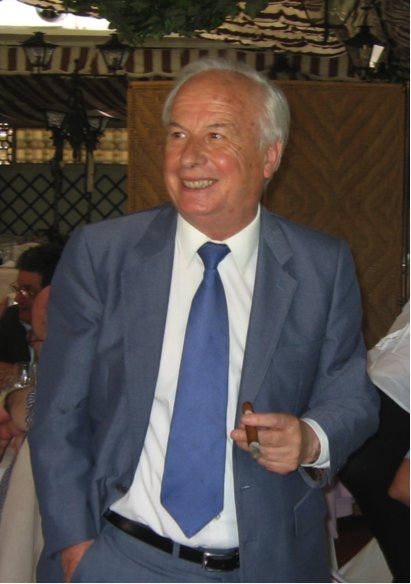Profesor Evaristo Riande

The 15th of November of 2012, Professor ad honorem Evaristo Riande García passed away in Mexico, where he was staging as Invited Professor and Lecturer at the Universidad Autónoma de México D.F.
Professor Riande began his scientific career in the Departamento de Plásticos del Patronato Juan de la Cierva (todays Instituto de Ciencia y Tecnología de Polímeros, ICTP-CSIC) in January 1963, where he investigated on ionic polyelectrolytes based on allyl cellulose. After finishing his PhD he became Tenured Scientist and broadened his studies to the flow of cellulose solutions in cadoxene under different shear rates. In 1971 he was promoted to Associate Professor and spent two years as Visiting Fellow at the Mellon Institute, at Pittsburg (USA), devoted to the study of the viscoelastic behavior of macromolecules in solution. Back in Spain he initiated theoretical and experimental studies on the influence of solvents and temperature on the crystallization kinetics of polyolefins. In 1975 he became interested in the conformational analysis of macromolecules, and the prediction of conformational properties at equilibrium.
In year 1984, already Professor at CSIC, he broadened his research interests to the response of macromolecules to external perturbations caused by mechanical or electrical force fields, so as to improve the understanding of liquids dynamics in relation to the glass transition. As a consequence of the huge growth of membrane technology applied to gas separation processes, in the mid-nineties Prof. Riande began theoretical and experimental studies on gas transport through polymeric membranes, being of special interest his theoretical studies in which he describes simulation techniques based on molecular dynamics procedures, that allow the prediction of solubility and diffusivity of gases through membranes, making use of the chemical structure, the temperature and pressure. As a logical evolution of his work he began a new research line devoted to the development and electrochemical study of ionic exchange membranes, potentially useful in batteries and fuel cells. As he himself explained, “with this research line I return to the point from where I started, the study of ionic exchange membranes”. It is not surprising then, that his last scientific adventure, at his 75 years, was the preparation of a book devoted to the physics and chemistry of ionic exchange polymeric membranes.
Professor Riande always fostered the search for the máximum scientific quality in all the work he undertook, as reflected in the 350 research articles he published along his life, as well as in the books he wrote in collaboration with Professors of several Universities, oriented to postgraduate students and professionals on material science (Dipole Moments and Birefringence of Polymers, Viscoelastic Properties of Polymers: Stress and strain in practice y Electrical Properties of Polymers), which include sets of solved problems at the end of each chapter. Likewise, he published numerous dissemination articles, some of them in journal published in Galicia in his mother tongue, Gallego. He also contributed to the organization of Congresses, both National and International, on polymers and relaxarion phenomena.
As a whole, Evarito Riande’s professional career reflectslove for his work, adaptation to existing resources, flexibility and ability to change topic aand derive his work to new areas whenever it seemed the best option, a strong liking for the collaboration with other research groups (Osaka, Kyoto, Fukoda, Tokyo y Toyota Research Center (Japón); Nanjing y Shanghai Jiao Tong (China); UNAM (México); Federal de Rio de Janeiro (Brasil); del Sur y Córdoba (Argentina), from where he was very frequently asked to participate in PhD juries, or to impart Lectures and Conferences.






